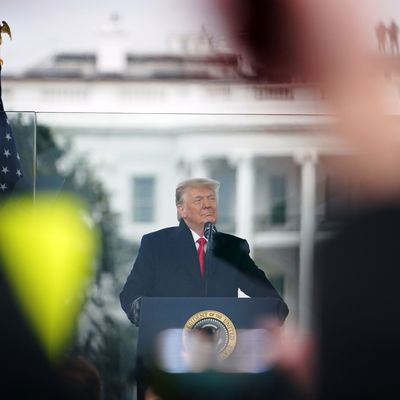
Donald Trump’s lawyers on Tuesday previewed their defense of the ex-president during next week’s impeachment trial, responding to pretrial brief filed by House managers accusing him of a “grievous betrayal” of his oath of office for inciting last month’s attack on the Capitol.
The House brief defends its interpretation of the Constitution as allowing — indeed, all but requiring — an impeachment and post-tenure conviction of a president who committed high crimes and misdemeanors while in office, in order to bar him from holding future office. But it devotes most of its content and passion to documenting the horrific events of the January 6 Capitol riot and Trump’s role in inciting it with his remarks to the mob near the White House that day. Their argument that Trump’s conduct rose to the level of an impeachable offense was rooted in the Constitution itself:
In particular, the Framers of the Constitution feared a President who would corrupt his office by sparing “no efforts or means whatever to get himself re-elected.” President Trump’s effort to extend his grip on power by fomenting violence against Congress was a profound violation of the oath he swore. If provoking an insurrectionary riot against a Joint Session of Congress after losing an election is not an impeachable offense, it is hard to imagine what would be.
Signaling a possible rationale for calling witnesses once the trial gets underway, the brief dwells on the chaos in the Capitol on January 6:
In the House, terrified Members were trapped in the Chamber; they prayed and tried to build makeshift defenses while rioters smashed the entryway. Capitol Police dragged furniture to barricade the House Chamber doors against the mob attempting to break in; they then drew their guns to guard the doors. Instructed to put on gas masks to protect against chemical agents, some Members called loved ones for fear that they would not survive the assault by President Trump’s insurrectionist mob.
Trump’s answer to the article of impeachment had, as expected, two principal thrusts: a denial of the constitutionality of an impeachment conviction of a president after his tenure had ended; and a defense of Trump’s conduct on January 6 as an exercise in free speech rather than an incitement to violence. The constitutional claim is based on the argument that a now-impossible “removal from office” is a necessary precondition to any “disqualification to hold future office,” and is thus no longer available to the Senate. The answer also claims that Trump was exercising a legitimate grievance in protesting the congressional confirmation of Biden’s victory (as close as the document gets to wading into his “stolen election” lies), and did not encourage or sanction violence among those answering his call for a protest at the Capitol. Trump’s lawyers go on to warn that the effort to sanction a “private citizen” represents an unconstitutional “bill of attainder,” and will exercise a chilling effect on free speech.
In a final flourish, Team Trump claims the House violated all precedents in impeaching their client because of the haste of the proceedings and the inclusion of multiple offenses in a single article.
On February 8, the House will file its response to Trump’s answer brief, and Trump’s lawyers will file a full pretrial brief. The trial is currently expected to begin the next day.






























